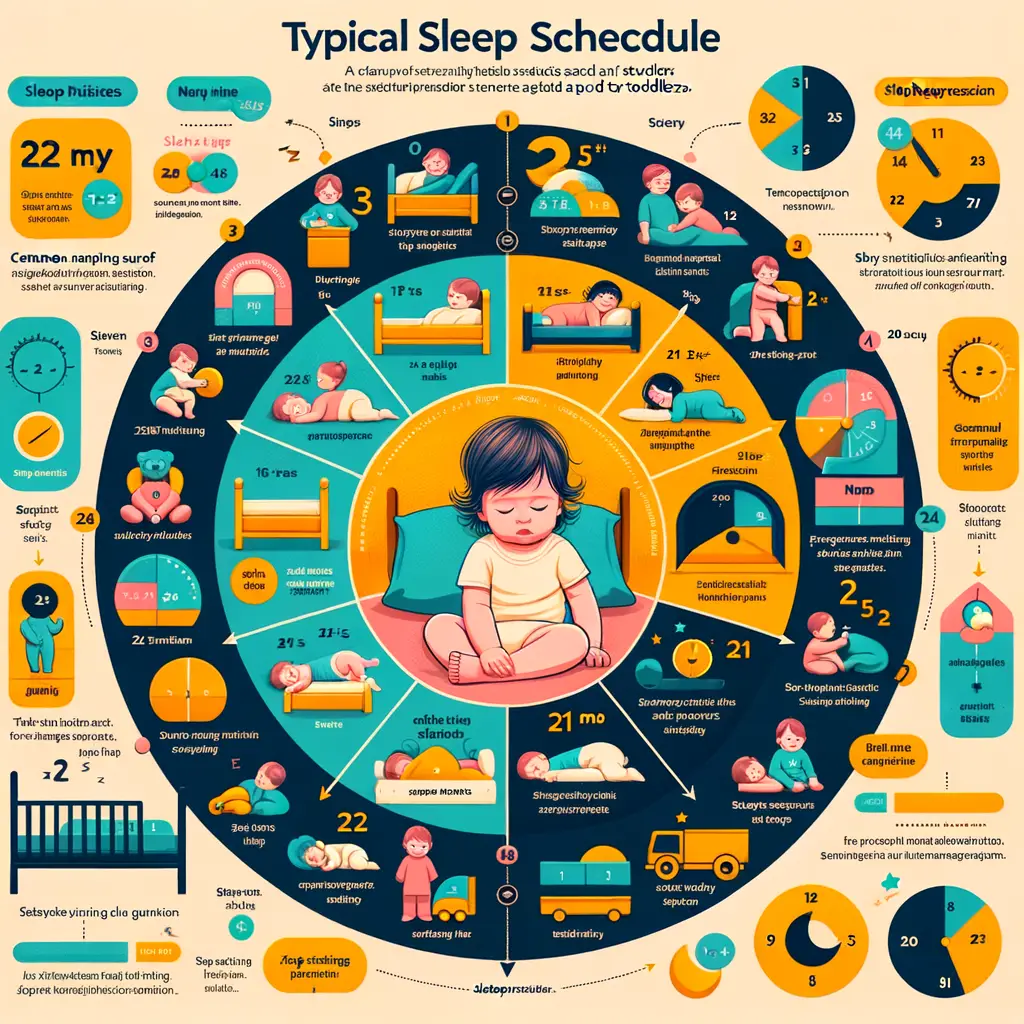Introduction to Toddler Sleep Schedule
As parents, we all know that sleep is crucial for our children’s health and development. But did you know that a consistent sleep schedule is just as important? In this post, we will delve into the importance of a regular sleep routine and understand the specific sleep needs of a 22-month-old toddler.
The Importance of a Consistent Sleep Schedule
Establishing a consistent sleep schedule for your toddler is not just about ensuring they get enough sleep. It’s about setting a routine that helps their body clock understand when it’s time to sleep and when it’s time to wake up. This can lead to better quality sleep and can also improve their mood and behavior during the day.
According to the Wikipedia, children aged 1-2 years need approximately 11-14 hours of sleep per day, including naps. A regular sleep schedule helps ensure your child gets the recommended amount of sleep.
Understanding Your 22-Month-Old’s Sleep Needs
At 22 months old, your toddler is growing and developing at a rapid pace, and their sleep needs are changing too. Most 22-month-olds need around 11-14 hours of sleep in a 24-hour period, including one or two daytime naps.
Understanding your child’s sleep needs can help you create a sleep schedule that works for your family and supports your child’s growth and development. Remember, every child is unique, and what works for one might not work for another. It’s important to pay attention to your child’s individual sleep cues and adjust their schedule as needed.

Understanding 22-Month-Old Sleep Routine
At 22 months, your toddler’s sleep routine is a crucial aspect of their overall health and development. It’s important to understand their sleep patterns and the amount of sleep they need to ensure they’re getting adequate rest. Let’s delve into the specifics.
Typical sleep patterns for a 22-month-old
At 22 months, toddlers typically have a predictable sleep pattern. They usually wake up early in the morning, have a nap in the afternoon, and go to bed at a consistent time each night. This routine helps regulate their body clock, promoting better sleep quality.
Most 22-month-olds sleep through the night, but it’s not uncommon for them to wake up once or twice. They might need comfort after a bad dream, or they might wake up if they’re not feeling well. It’s important to respond to these night wakings calmly and consistently to help your toddler learn to self-soothe and go back to sleep.
How much sleep does a 22-month-old need?
According to the American Academy of Pediatrics, a 22-month-old toddler needs between 11 to 14 hours of sleep in a 24-hour period. This includes nighttime sleep and one or two daytime naps. Remember, every child is different, and some might need more or less sleep than others.
It’s important to note that quality of sleep is just as important as quantity. Ensuring your toddler has a comfortable, quiet, and dark environment to sleep in can significantly improve their sleep quality.
Understanding your 22-month-old’s sleep routine is the first step towards ensuring they get the rest they need. Stay tuned for our next section where we’ll discuss mastering the 22-month-old nap schedule.
Mastering the 22-Month-Old Nap Schedule
Understanding and mastering the nap schedule of a 22-month-old toddler can be a challenging task. However, with the right knowledge and consistency, it can be achieved. Let’s delve into the specifics.
How many naps does a 22-month-old need?
At 22 months, most toddlers have transitioned from two naps a day to just one. This nap typically lasts between 1 to 3 hours. Remember, every child is unique and may require more or less sleep. It’s crucial to observe your child’s behavior and adjust their nap schedule accordingly. If they seem cranky or overtired, they might need more sleep. On the other hand, if they’re energetic and alert, they might be getting enough sleep already.
Best times for naps
The best time for a nap is usually after lunch, around 12:30 to 1:00 PM. This timing helps ensure that your toddler doesn’t get overtired before bedtime. However, the exact timing can vary based on your child’s wake-up time and bedtime. It’s essential to maintain a consistent nap schedule, as this helps regulate your child’s internal body clock and promotes better sleep.
Mastering the 22-month-old nap schedule is all about understanding your child’s sleep needs and maintaining consistency. It might take some trial and error, but with patience and persistence, you can establish a nap schedule that works for both you and your toddler.
Remember, sleep is crucial for your child’s growth and development. So, make sure they’re getting the right amount of sleep they need.

Sleep Training for Toddlers
Getting your toddler to sleep can sometimes feel like an uphill battle. But, with the right methods and techniques, it can become a smooth process. Let’s explore some of the most effective sleep training methods for toddlers.
Methods and Techniques
Gradual Retreat Method
This method involves slowly moving away from your toddler’s bed over time. Initially, you might sit next to their bed as they fall asleep. Gradually, you move further away until you’re out of the room. This method can be comforting for toddlers as they learn to sleep independently. It’s a gentle approach that can take a few weeks to work, but it’s worth the patience.
Controlled Crying Method
Also known as the Ferber method, this technique involves letting your toddler cry for a predetermined amount of time before you comfort them. The idea is to gradually increase the time between your responses to their cries. This method can be tough for parents to follow through, but many find it effective. Remember, it’s not about neglecting your child’s needs, but about teaching them to self-soothe.
No-Tears Method
The No-Tears method focuses on comforting routines and positive reinforcement. Instead of letting your toddler cry, you use techniques like storytelling, lullabies, and cuddles to help them fall asleep. This method requires consistency and can take time, but it’s a gentle approach that avoids any distress.
Remember, every child is different, and what works for one might not work for another. It’s important to choose a method that feels right for you and your toddler. With patience and consistency, sleep training can lead to better sleep for everyone in the family.

Implementing Sleep Training
Now that we’ve explored various sleep training methods, let’s delve into how to implement them effectively. Here are two crucial steps to consider:
Creating a Soothing Bedtime Routine
Establishing a calming bedtime routine is the first step in sleep training. This routine should signal to your toddler that it’s time to wind down and prepare for sleep. It could include activities such as a warm bath, reading a story, or listening to soft music. The key is consistency. Doing the same activities in the same order every night helps your child understand what to expect, making the transition to sleep smoother.
Dealing with Sleep Resistance
Even with a soothing bedtime routine, your toddler may resist going to sleep. This is a common challenge in sleep training. It’s important to remain patient and consistent. If your child cries or gets out of bed, calmly return them to their room and remind them it’s time to sleep. Avoid engaging in play or lengthy conversations as this can stimulate your child and make it harder for them to fall asleep. Remember, the goal is to teach your child to self-soothe and fall asleep independently.
Implementing sleep training can be a challenging process, but with patience and consistency, you can help your toddler develop healthy sleep habits. Remember, every child is unique, so what works for one may not work for another. It’s important to tailor your approach to your child’s individual needs and temperament.
Addressing Toddler Sleep Problems
When it comes to toddler sleep problems, one of the most common issues parents face is the 22-month-old sleep regression. This is a phase where your toddler’s sleep pattern can change drastically, often leading to sleepless nights for both the child and the parents.
22-Month-Old Sleep Regression
At around 22 months, many toddlers experience what is known as sleep regression. This is a period of time when a toddler who has been sleeping well suddenly starts waking up at night, and has difficulty falling back to sleep. Let’s explore the signs of sleep regression and how to handle it.
Signs of sleep regression
The signs of sleep regression in a 22-month-old can vary, but common indications include:
Increased night waking
Difficulty falling asleep at naptime or bedtime
Resistance to going to bed
Early morning waking
How to handle sleep regression
Dealing with sleep regression can be challenging, but here are some strategies that can help:
Maintain a consistent bedtime routine: A predictable routine can provide a sense of security and help your child understand that it’s time to sleep.
Ensure your child is getting enough daytime sleep: Over-tiredness can contribute to sleep regression. Make sure your child is getting adequate naps during the day.
Provide a comforting object: A favorite blanket or toy can provide comfort and help your child self-soothe during the night.
Patience is key: Remember, sleep regression is a phase and it will pass. Stay patient and supportive.
Understanding and addressing sleep regression is key to ensuring your toddler gets the sleep they need. Remember, every child is different and what works for one might not work for another. It’s important to be patient, consistent, and flexible as you navigate this challenging phase.
Common Sleep Issues and Solutions
When it comes to toddler sleep, there are several common issues that parents often encounter. These problems can disrupt your child’s sleep schedule and make bedtime a stressful time for both of you. Let’s take a look at three of these issues and explore some solutions.
Nightmares and Night Terrors
Nightmares and night terrors can be a common issue in toddlers. They can cause your child to wake up in the middle of the night, scared and upset. It’s important to comfort your child and reassure them that it was just a dream. You can also try to establish a calming bedtime routine to help prevent nightmares. This might include reading a soothing story or playing soft music before bed. Learn more about nightmares and night terrors here.
Bedtime Resistance
Many toddlers resist going to bed, which can be frustrating for parents. To combat this, try to establish a consistent bedtime routine. This could include activities like taking a bath, brushing teeth, and reading a story. Make sure your child knows what to expect each night. It’s also helpful to ensure your child is getting enough physical activity during the day to help them feel tired at bedtime. Learn more about establishing a healthy sleep routine here.
Early Morning Wake-Ups
Some toddlers wake up very early in the morning, which can be tiring for parents. If this is a problem for your child, try to adjust their bedtime to a later time. You can also use blackout curtains in their room to block out early morning light. It’s also important to ensure your child is getting enough sleep overall. If they’re not, they may wake up early because they’re overtired. Learn more about the effects of sleep deprivation here.
Remember, every child is different and what works for one may not work for another. It’s important to be patient and try different strategies until you find what works best for your child’s sleep issues.
Sleep Tips for 22-Month-Old
Getting your 22-month-old to sleep can sometimes feel like a challenge. However, with the right tips and strategies, you can make bedtime a more enjoyable experience for both you and your toddler. Here are some key tips to help your 22-month-old get the sleep they need.
Creating a Sleep-Friendly Environment
First and foremost, it’s essential to create a sleep-friendly environment for your toddler. This means ensuring their room is dark, quiet, and at a comfortable temperature. You might want to consider using blackout curtains to block out any light and a white noise machine to drown out any potential disturbances. It’s also important to make sure their bed is comfortable and inviting. A favorite blanket or stuffed animal can also help make their bed feel more familiar and comforting. Sleep hygiene is a crucial factor in promoting good sleep habits.
Establishing a Consistent Bedtime Routine
A consistent bedtime routine can help signal to your toddler that it’s time to wind down and get ready for sleep. This routine might include activities like a warm bath, reading a story, or listening to calming music. It’s important to stick to this routine as closely as possible every night. Consistency is key when it comes to establishing good sleep habits. According to a study, a consistent bedtime routine can significantly improve a child’s sleep quality and duration.
Encouraging Self-Soothing
At 22 months, your toddler is capable of learning to self-soothe, which can be a valuable skill when it comes to sleep. This might involve techniques like sucking on a thumb or a pacifier, or cuddling a favorite blanket or stuffed animal. It’s important to give your toddler the opportunity to self-soothe at bedtime, rather than rushing in at the first sign of distress. Over time, this can help them become more independent and confident in their ability to fall asleep on their own.
In conclusion, getting your 22-month-old to sleep doesn’t have to be a struggle. By creating a sleep-friendly environment, establishing a consistent bedtime routine, and encouraging self-soothing, you can help your toddler get the sleep they need and deserve.
Understanding Toddler Sleep Habits
Understanding your toddler’s sleep habits can be a challenging task, but it’s crucial for their growth and development. In this section, we will discuss the common sleep habits of 22-month-olds and when to be concerned about these habits.
Common sleep habits of 22-month-olds
At 22 months, toddlers typically sleep for about 11 to 14 hours a day, including naps. They may have one or two naps during the day, each lasting about 1 to 3 hours. Some common sleep habits include:
Resistance to bedtime: It’s common for toddlers to resist going to bed at this age. They may want to stay up and play or spend time with family.
Night waking: Toddlers may wake up during the night due to nightmares, night terrors, or simply because they’re not tired.
Early rising: Many toddlers wake up early in the morning, often before their parents are ready to start the day.
When to be concerned about sleep habits
While it’s normal for toddlers to have some sleep disruptions, there are times when you should be concerned. If your toddler is consistently having trouble falling asleep, staying asleep, or seems excessively tired during the day, it may be a sign of a sleep disorder. Other signs to watch for include:
Snoring: While occasional snoring is normal, consistent snoring can be a sign of sleep apnea, a serious condition that requires medical attention.
Restless sleep: If your toddler tosses and turns a lot during sleep, it could indicate a problem.
Difficulty breathing: If your toddler has trouble breathing during sleep, seek medical attention immediately.
Remember, every child is unique and their sleep habits can vary. If you’re concerned about your toddler’s sleep, it’s always best to consult with a healthcare professional. They can provide guidance and help you understand if there’s a problem or if your toddler’s sleep habits are just part of their normal development.
Conclusion: The 22-Month-Old Bedtime Routine
As we wrap up this comprehensive guide on the 22-month-old’s sleep schedule, it’s crucial to remember that every child is unique. What works for one might not work for another. However, understanding the basics of toddler sleep and implementing a consistent routine can significantly improve your child’s sleep quality and overall well-being.
Recap of key points
Throughout this guide, we’ve covered several important aspects of a 22-month-old’s sleep schedule. We’ve learned that toddlers typically need about 11 to 14 hours of sleep, including naps. We’ve also discussed the importance of a consistent bedtime routine, which can include activities like reading a book, taking a bath, and saying goodnight to everyone.
We’ve delved into common sleep problems at this age, such as night terrors and sleep regression, and offered solutions to address them. Furthermore, we’ve highlighted the significance of understanding your toddler’s sleep habits and cues to ensure they’re getting enough rest.
Final tips for mastering the 22-month-old’s sleep schedule
As we conclude, here are some final tips to help you master your 22-month-old’s sleep schedule:
Stay consistent with the bedtime routine. This helps signal to your toddler that it’s time to wind down and get ready for sleep.
Ensure your child’s sleep environment is conducive to good sleep. This means a dark, quiet, and cool room.
Limit screen time before bed as it can interfere with your child’s ability to fall asleep.
Encourage healthy sleep habits by promoting regular physical activity during the day and a balanced diet.
In conclusion, mastering the 22-month-old’s bedtime routine requires patience, consistency, and understanding of your child’s unique needs. Remember, it’s not about perfection, but progress. With time and practice, you’ll find a routine that works best for your toddler and your family.














